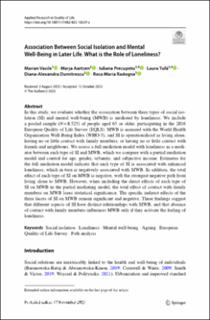| dc.description.abstract | In this study, we evaluate whether the association between three types of social iso- lation (SI) and mental well-being (MWB) is mediated by loneliness. We include a pooled sample (N=8,525) of people aged 65 or older, participating in the 2016 European Quality of Life Survey (EQLS). MWB is assessed with the World Health Organization Well-Being Index (WHO-5), and SI is operationalised as living alone, having no or little contact with family members, or having no or little contact with friends and neighbours. We assess a full mediation model with loneliness as a medi- ator between each type of SI and MWB, which we compare with a partial mediation model and control for age, gender, urbanity, and subjective income. Estimates for the full mediation model indicate that each type of SI is associated with enhanced loneliness, which in turn is negatively associated with MWB. In addition, the total effect of each type of SI on MWB is negative, with the strongest negative path from living alone to MWB. However, when including the direct effects of each type of SI on MWB in the partial mediating model, the total effect of contact with family members on MWB loses statistical significance. The specific indirect effects of the three facets of SI on MWB remain significant and negative. These findings suggest that different aspects of SI have distinct relationships with MWB, and that absence of contact with family members influences MWB only if they activate the feeling of loneliness. | en_US |

